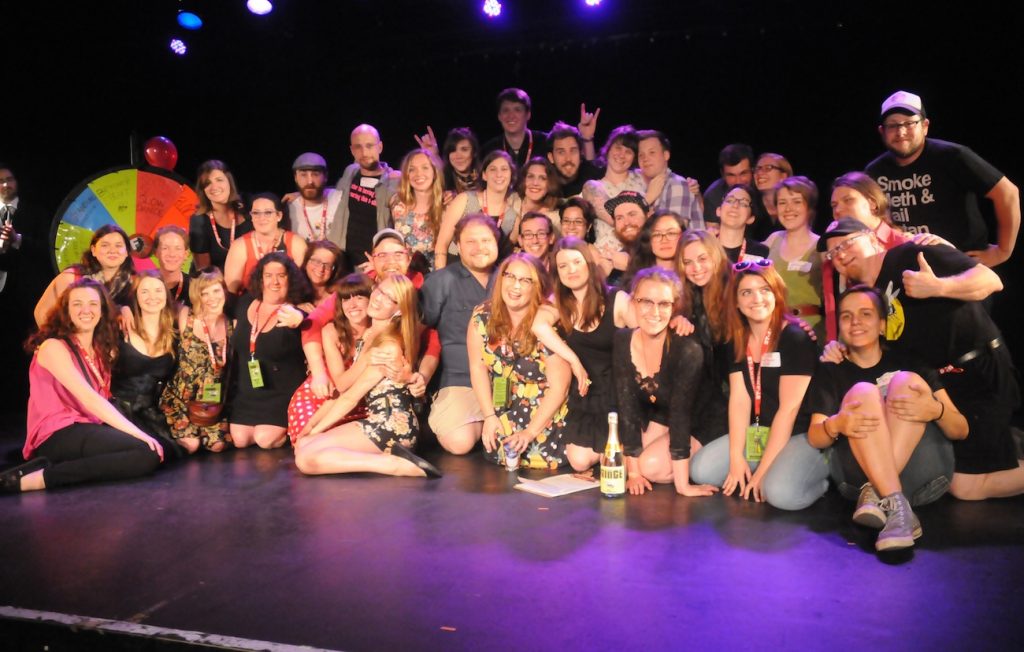
Anything goes. ANYTHING. From a solo spoken word show to a company’s debut production to inspiring contemporary dance to saucy burlesque to reading a phone book aloud onstage to puppetry for all ages to stand-up comedy to a musical to a complete train wreck to the next big thing in Canadian theatre. Anything really goes (as long as it stays within the law of course!).
But does it work on paper? Good question. If you’ve never been to a Fringe before, you might think that the concept of an uncurated or unjuried festival is a risky approach, but for over three decades the Fringe has made an everlasting mark on the Canadian theatre landscape. Starting in Edmonton in 1982, there are now seventeen Fringe Festivals in Canada and twenty-three festivals as a part of the Canadian Association of Fringe Festivals which also encompasses several American Fringe Festivals. Uniting these festivals are our unique set of ideals (taken from the CAFF website):
- Participants will be selected on a non-juried basis, through a first-come, first-served process, a lottery, or other method approved by the Association.
- The audience must have the option to pay a ticket price, 100% of which goes directly to the artists.
- Fringe Festival producers have no control over the artistic content of each performance. The artistic freedom of the participants is unrestrained.
- Festivals must provide an easily accessible opportunity for all audiences and all artists to participate in Fringe Festivals.

I may be the Executive and Artistic Director of MainLine Theatre (the company that produces the Montreal Fringe), but I often refer to myself as simply the Festival Director come Fringe season. You will routinely find me overseeing operations, working on audience development or coming up with a new marketing plan. The truth is that I often feel like a protector of the festival. I’m not involved in the content of performances, I’m facilitating the conditions under which the art will hopefully thrive.
I wonder: Am I influencing the curation of the festival if I visit a ton of schools to do outreach around application time? Will there be more French companies in the festival if I post on billboards in France? Is it wrong to target the application process to specific groups? Seeing as we select by lottery, will there ever be a dud Fringe, where most of the shows aren’t very good?

With that in mind, it’s possible for one to be tempted to turn their back on the values of the Fringe movement. The most significant part of my job as a Fringe director is to uphold the integrity of the festival by following our national mandate and therefore protecting its values of diversity, accessibility and community. The moment a Fringe Festival anywhere starts to abandon its ideals, is the moment that festival begins to lose its authenticity. I.e., it might be easier in Montreal to acquire more funding or to sell a few more tickets if we could guarantee that every show is going to be an entertaining box office success.
The challenge is to be confortable with the risk that the festival’s artistic structure creates. For years, the Montreal Fringe’s reputation in our city’s festival landscape was built on being the alternative that welcomes boldness and brass. While always being badass. When you have a festival that has over 100 productions, it’s certainly easy to rely on the productions that push the envelope to stick out of the pack.
But while celebrating risk taking is an important part of what we do, the real passion I hold lies in the ideals, in that we are a part of a revolution in Canadian theatre that is gaining more and more momentum with each passing decade.
VIVE LA RÉVOLUTION FRINGE !









